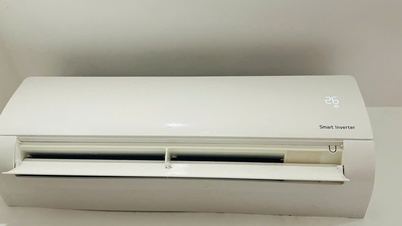Air purifiers can remove irritants such as mold and dust; regularly cleaning doormats, blankets, and pillows helps prevent respiratory illnesses.
A clean bedroom helps ensure good health, prevents asthma attacks and allergy symptoms, and contributes to an improved living environment. Here are some suggestions for cleaning your bedroom.
Do not keep pets in the bedroom.
Animal hair, saliva, and urine can bring allergens, mold, and pollen from outside into the home. Families with pets should vacuum regularly and avoid keeping cats and dogs in bedrooms.
Remove mold
It's advisable to regularly check your living space for signs of mold, such as condensation on windows. If this occurs, you should wipe the windows and glass to remove the mold. In humid weather, families can use a dehumidifier.
Do not store damp or sweat-soaked clothes in laundry baskets in the bedroom. Moldy clothes can trigger asthma attacks in people with asthma or respiratory illnesses in those with weakened immune systems. Most mold spores are harmless, but in humid conditions they can be harmful to young children, the elderly, and those with sinusitis.
Use an air purifier.
Air purifiers can remove irritants such as smoke, mold, and dust. It's advisable to open windows and doors to allow clean outside air to flow into the house.
In winter, it's best to open windows in the early morning sun for a shorter period to minimize cold air entering the house and avoid health problems. In summer, windows should be opened in the late afternoon to let in the breeze. If living in an area with high pollution levels, families should limit opening windows or use curtains to block out dust.

Open the window to let fresh air into the bedroom. Photo: Freepik
Washing bed sheets, curtains, and carpets.
Carpets harbor mold and dust mites that affect the respiratory system. These become airborne when vacuuming or when you step on them. According to the U.S. Centers for Disease Control and Prevention (CDC), dust mites are one of the most common indoor asthma triggers.
Curtains, bedding, and pillows that harbor dust mites are also bad for the lungs, triggering asthma attacks when inhaled. Cleaning doormats, bedding, and pillows about three times a week, and curtains regularly at least once a month, helps avoid the risk of illness.
Indoor plants can absorb dust and harmful airborne pollutants such as formaldehyde, benzene, and toluene, especially in enclosed spaces with poor air circulation. They also help increase humidity and lower room temperature.
Vacuum regularly.
Vacuum cleaners help clean floors and remove dust and dirt from tight spaces such as window crevices, baseboards, or staircases. Clothes stored in wardrobes can accumulate lint or fibers. Taking everything out to clean them takes a lot of time. Therefore, a handheld vacuum cleaner easily cleans the nooks and crannies inside wardrobes and removes lint from clothing surfaces.
Le Nguyen (According to WebMD )
Source link






![[Photo] Prime Minister Pham Minh Chinh attends the Conference summarizing and implementing tasks of the judicial sector.](/_next/image?url=https%3A%2F%2Fvphoto.vietnam.vn%2Fthumb%2F1200x675%2Fvietnam%2Fresource%2FIMAGE%2F2025%2F12%2F13%2F1765616082148_dsc-5565-jpg.webp&w=3840&q=75)









































































































Comment (0)